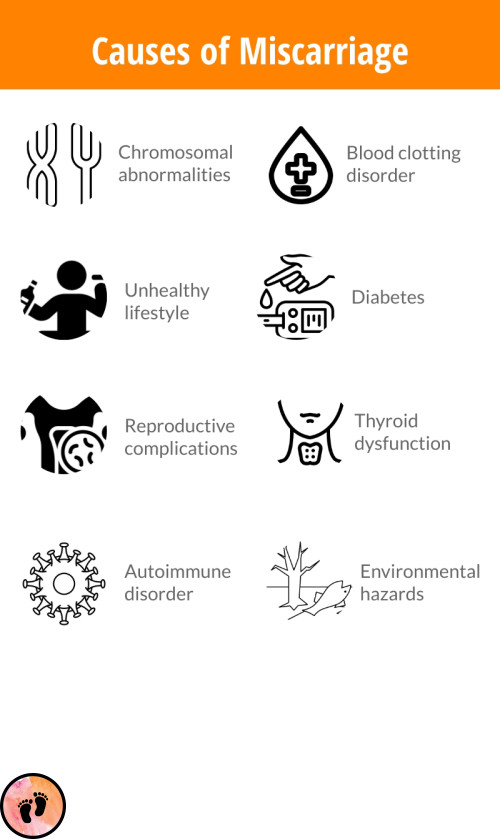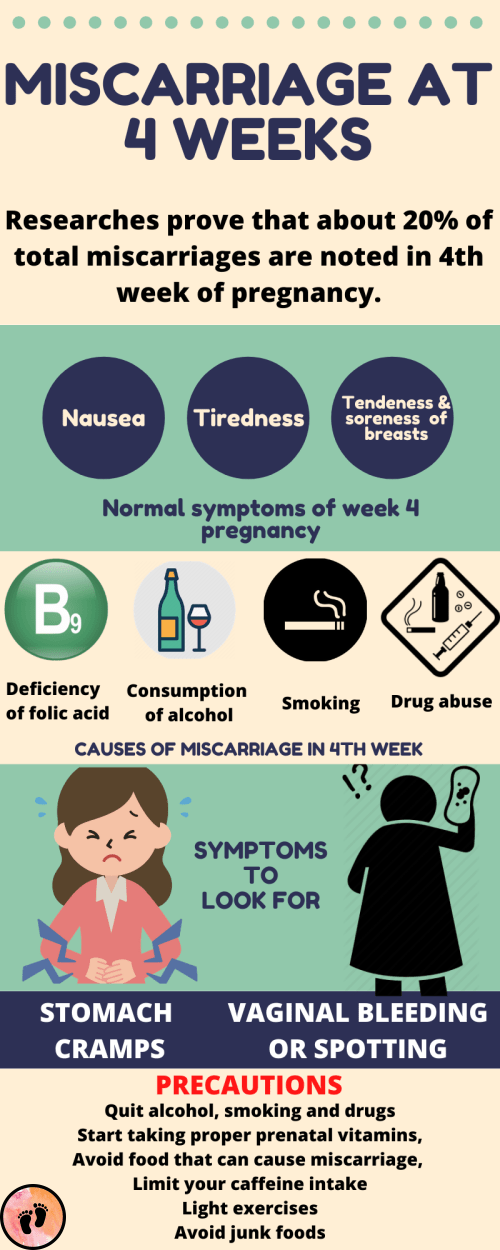Miscarriage in first trimester
Miscarriage is a medical term for terminated pregnancy or pregnancy loss that happens on its own, within 20-24 weeks of conception.
The average per cent of miscarriages in childbearing age females ranges from 10-25%.
Recent studies have shown that Indian women are more prone to spontaneous miscarriages as compared to other ethnicities.
Most miscarriages happen within 13 weeks of gestation. Even thought of this scares you a hell out. It is better to get educated yourself with all probable causes and precautions that may lead to complications
It is heartbreaking and many women go in deep depression during this mishap.
6 Types of miscarriages
1. Threatened miscarriage
A signal that your body gives that you are at high risk of miscarriage. In this kind, a woman may experience a slight or little vaginal bleeding with lower abdominal pain. Cervix remains closed and may last for several days or weeks.
There is 50-50 chance that you may or may not have a healthy pregnancy and may have to terminate your pregnancy. There is nothing much that you can do for this misshapen.
2. Inevitable miscarriage
This follows the threatened miscarriage without warning signs. There is heavy vaginal bleeding with strong, intense cramps in the lower abdomen. During this, the cervix opens and may wash out the fetus through the bleeding.
3. Complete miscarriage
This is the phase when all pregnancy tissues have washed out and uterus contracts to vacate all the tissues that result in strong cramps. Vaginal bleeding may last for a few days.
4. Incomplete miscarriage
If the uterus still holds the pregnancy tissues, it is termed as incomplete miscarriage. You may feel abdominal cramps and vaginal bleeding as the uterus is trying to remove it out.
Your gynaecologist will perform a short procedure in operation theatre called “D&C (Dilatation of the cervix and curettage of the uterus)” to remove all remaining in the uterus.
5. Missed miscarriage
Missed miscarriage is when the baby has passed away but is still in the uterus. This may lead to dark reddish discharge.
One may experience all pregnancy symptoms and find nothing unusual until an ultrasound.
6. Recurrent miscarriages
If the miscarriage episodes are three or more in a row, it is termed as recurrent miscarriages. Your doctors may investigate the exact reason behind this and refer to the specialist.
Causes of miscarriage
Some of the major causes are listed below ranging from the one where you don't have much control like
Chromosomal abnormalities, Blood clotting disorders or autoimmune disorders to other causes which can be controlling by making lifestyle changes like
Lifestyle disorders, certain infections, smoking, alcohol consumption, etc.
environmental hazards. Click here for more read
 Common Causes of Miscarriage During Pregnancy
Common Causes of Miscarriage During Pregnancy
Miscarriage at 4 weeks of pregnancy
The period where your baby has just implanted in the uterus. The baby is the size of a poppy seed and is a bunch of cells called blastocyst.
The normal symptoms in 4th week of pregnancy can be nausea, tiredness, tenderness and soreness in breasts, food cravings and extra sensitivity towards the smell.
Researches prove that about 20% of total miscarriages are noted in 4th week of pregnancy. The miscarriage in 4th week of pregnancy is dictated as “Chemical pregnancy”. This happens shortly after implantation. One may not even come to know that she was pregnant.
 Miscarriage at 4 weeks
Miscarriage at 4 weeksCauses of Miscarriage at 4 weeks
Although, the cause for this miscarriage is unclear. Probable reasons for chemical pregnancy could be a deficiency of folic acid, unhealthy lifestyle, consumption of alcohol, drug abuse and smoking.
Symptoms to look for:
- Stomach cramps
- Vaginal bleeding or spotting lasting for a few days
Not all vaginal bleeding can be connected to miscarriage. Vaginal bleeding may happen as a result of implantation. It is advisable to keep a close eye on the bleeding and talk to your doctor.
Precautions for Miscarriage at 4 weeks
- Quit alcohol, smoking and drugs
- Start taking proper prenatal vitamins, iron and folic acid
- Light exercises; not the heavy ones
- Limit your caffeine uptake
- Avoid junk foods and foods that assist pregnancy loss
Miscarriage at 8 weeks of pregnancy
The period where your baby is processing from embryo to fetus. The baby is a kidney bean-sized.
The normal symptoms in 8th week of pregnancy can be nausea, tiredness, tenderness and soreness in breasts, heartburn, sleeplessness, frequent urination.
Miscarriages risk at even this week is quite high.
Causes of Miscarriage at 8 weeks
Although, the cause for this miscarriage is unclear. Probable reasons continue to be the deficiency of folic acid, iron, unhealthy lifestyle, consumption of alcohol, drug abuse and smoking, lower hormone levels, diabetes, thyroid dysfunction and autoimmune disorders.
Symptoms to look for:
- Strong intense stomach cramps
- Vaginal bleeding or spotting lasting for few days; dark reddish discharge with tissues
- Keep a check if the vaginal bleeding has tissue
Precautions for Miscarriage at 8 weeks
- Get checked for hormone levels – hCG
- Get checked for thyroid levels, take proper medications if not on right mark of the scale
- Ask doctor, if your pregnancy on high risk?
- Take advice from the doctor before starting any exercise
- Consume foods that are listed safe
- Quit alcohol, smoking and drugs
- Keep a close check on all prenatal supplements
Graduating from 8th week lessens down the risk of miscarriage
Miscarriage at 12 weeks of pregnancy
The baby is the size of an apricot at this week. At the end of 12 week your first trimester will be over and the risk of miscarriage falls significantly.
The normal symptoms in 12th week of pregnancy can be the pigmentation of skin, darkening of areola, soreness and tenderness of breasts
Cause of Miscarriage at 12 weeks
Probable reasons continue to be the deficiency of thyroid dysfunction, diabetes, autoimmune disorders, certain environmental hazards that leads to inhalation of toxic metals such as arsenic, mercury; pesticides etc.
Symptoms to look for:
- Vaginal bleeding or spotting with strong and intense cramps that last for a day or more
- Keep checking if the vaginal bleeding has tissue
Precautions for Miscarriage at 12 weeks
- Eat healthy and balanced diet
- Take proper supplements
- Ask doctor, if your pregnancy on high risk?
- Take advice from the doctor before starting any exercise
- Consume foods that are listed safe
- Quit alcohol, smoking and drugs
Once you pass this week, you are marked with the lowest risk of miscarriage.
The first trimester although is a very happy phase as you have just stepped in a beautiful phase. But at the same time, it becomes devastating or distressful when you find yourself into the pool of pregnancy termination.
Do take the support of family and caretaker to help you get out of this depression. Not all miscarriages are recurrent, talk to the practitioner and take all preventive measures possible for next pregnancy.

Recent Posts
Homemade Pregnancy Test
How to Prevent Pregnancy Stretch Marks
Is It Safe to Eat Ice Cream During Pregnancy
Breast Pain in Pregnancy
7 Tips to getting pregnant faster
COMMON INFECTIONS DURING PREGNANCY
Pregnancy Diet: Apples during Pregnancy
Advertisement
Duis leo. Donec orci lectus, aliquam ut, faucibus non
Join Our Community of Expecting Parents Today!
Subscribe to get updated on latest and relevant pregnancy-related details